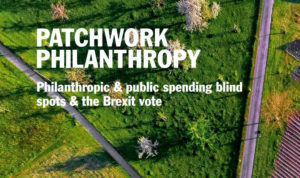Patchwork Philanthropy
This blog was written by Rachel Rank, 360Giving and Helen Goulden, CEO of Young Foundation. The blog is cross-posted from the Young Foundation’s website (original can be found here)
Patchwork Philanthropy – What can funding and spending data tell us about communities and place?
Funders are increasingly ‘turning to place’ as the answer to addressing inequality. This has become a particularly hot topic since the June 2016 referendum results, with concerns that certain communities are being left behind or ignored.
Despite this increased focus on place, recent studies on inequality and austerity in the UK have shown that central and local government are often failing to address inequality and meet the needs of local populations. We know that there are deprived areas in England that receive lower levels of public spending per capita compared to other local authorities and that charitable funding is not spread equitably, with some deprived areas receiving less philanthropic funding than others. But less is known about the combined impact that trust, foundation and charity funding is having on communities and whether the issue is being compounded by these organisations.
The Young Foundation wanted to explore these relationships and see whether there is a link between levels of philanthropic giving, charity spend and public spending in the build up to the referendum, area deprivation, and the EU referendum vote.
As far as we are aware, this is the first time this kind of analysis has been done – partly because it’s hard to find open, comparable data about funding to a specific place. The researchers used 5 England only datasets, including charity commission and 360Giving grants data. The methodology can be found in the main report here.
 Findings
Findings
The data shows that a lack of philanthropic funding is also a strong predictor for local authority areas voting to leave the EU. Remain areas not only tend to be less deprived but on average, they have also benefited from more funding and expenditure from philanthropic and public bodies. The difference is particularly striking for charitable spend (where an average expenditure per head was £172 in leave areas compared to £350 in remain areas) and public core spending (where an average expenditure per head was £465 in leave areas compared to £618 in remain areas).
The research team also looked at the geographic spread of the leave vote, public spending, charitable spend and trust and foundation funding. There were significant variations across the board.
The team also found a number of philanthropic funding and expenditure ‘deserts’ across England. Although the North of England is the most deprived area in the UK, overall its the Midlands that has seen the highest levels of deprivation and lowest levels of funding and expenditure combined. In fact eight out of the ten local authorities with the highest levels of deprivation and lowest levels of funding and expenditure combined were from the midlands. Four of these ten local authorities also were also in the top ten local authorities that voted to leave.
The analysis indicates there are a number of communities that voted for change and are living in deprivation with low levels of state and philanthropic resources. These communities may not be widely acknowledged and would benefit from increased investment.
What next?
As more grants data is shared in the 360Giving standard, it will be easier to undertake this kind of analysis in future. Please contact 360Giving to find out more about what’s involved: info@threesixtygiving.org. You can see, search and download all the grants data currently being shared by visiting http://grantnav.threesixtygiving.org
This piece of work has exposed a number of opportunities to better collect and use data about communities as part of better identifying community needs and resources and the Young Foundation are particularly interested in growing this work, and combining with place-based qualitative data sets. If you would like to know more about our plans or to tell us about any community datasets that might be useful, please contact us at hello@youngfoundation.org.
The full report is available here.
